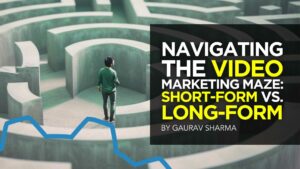
I found an interesting discussion/argument on Twitter that was sparked when someone mentioned that “Marketing is dead.” Plus there is no shortage of people proclaiming online (every year, it seems) that “SEO is dead.”
I know that content marketing isn’t exactly traditional marketing, but it is marketing nonetheless. I’m not here to argue whether they are dead or not (they aren’t, the fact that you look up stuff on Google is enough proof of that), but if people insist on content marketing vs SEO, then we should look at what they actually are for and if they’re worth the investment.
- What is content marketing?
- What is SEO?
- What if I focus on content marketing vs SEO or vice-versa?
- My advice: Do them together
- Key takeaway
What is content marketing?
Content marketing is the practice of creating and sharing useful and relevant content in the form of articles, podcasts, videos, and such to attract, acquire, and retain your target audience and build a long-term relationship with them.
For example, here at SEO Hacker I run a blog about SEO, digital marketing, and Google updates that I then share to my audience because this is my expertise and I want people interested in these topics—whether beginners or not—to have access to good, well-written, and well-researched information.

Aside from that, we have free case studies that you can download in case you need hard data.

I also have a podcast called The Leadership Stack where I interview entrepreneurs all over the world and discuss business, finance, and leadership. We also answer listener questions on our AMA Thursdays.

All this content, for free.
As you can see, my priority is creating good content and building a relationship with my audience. When they go on my websites, they have a pain point that they need addressed, so I want to make sure that they get the solution from me and even share it with their friends and colleagues.
By doing content marketing, I also set myself as an industry leader—a professional who is knowledgeable in their field. If you’re a potential customer, you would not want to hire someone who has no proof that they know what they’re doing.
What is SEO?
SEO, or Search Engine Optimization, is the practice of optimizing a website for maximum visibility on search engines to increase organic traffic. By maximum visibility, what I mean is that we work hard to put your website on the first page of the SERPs (search engine results page).
For example, with SEO Hacker we make sure to rank #1 on the SERPs for the keyword “SEO Philippines.” As I mentioned in my previous blog post, if my company can’t even rank for our own keywords, why would you hire us? I make sure that I practice what I preach, which is holistic, white hat SEO that gets me and my clients’ websites on the first page for maximum visibility.

Why the first page? Because nobody ever really looks at the second page of the SERPs.
Although I mentioned that we optimize for search engines, that does not mean we leave people behind. One mistake that some make is to focus exclusively on search engines. You have to remember that it is people who submit their queries, not Google. So a crucial aspect of SEO is empathizing with customers to optimize for their search intent, ease of use, and so on.
What if I focus on content marketing vs SEO or vice-versa?
Let’s say you wrote this helpful piece on the difference between social media monitoring and listening.
Then you just… let it sit there.
Yes, you’re supposed to write content that is relevant and useful and will generally promote itself through the likes and shares of your readers. However, no matter how good your content is, if it’s not searchable, it’s not optimized both for people and search engines, you don’t reach out to webmasters to build relationships and promote your content, then your efforts in writing awesome content will be wasted.
On the other hand, your optimization will be very limited without informative, well-written content. You can’t just have keywords floating around your webpages and expect to rank. SEO works well because you’re providing answers to searcher’s questions. If you don’t have the content, then why would anyone go to your website for answers?
My advice: Do them together
Instead of pitting content marketing vs SEO, I suggest doing content marketing and SEO.
As someone who is selling a product or service, you have knowledge in that field. You have information and a perspective that not everyone else has, and you can make shareable content off of that.
Then of course, let that content work with SEO to help you become searchable online and visible to your target market. As I mentioned earlier, establish yourself as an industry leader that people come to for answers.
Remember that people who go on Google or other search engines don’t really go there to just pass the time, unlike those who go on social media. These people have a goal in mind, which is to look for information, to purchase a product or service, and so on.
For example, let’s say a CEO is looking to invest in SEO for their company. They know that prices can be a little steep, so they want to know how to maximize their SEO ROI.

Because I wrote an article on that, they can easily find my company when they Google, “How to maximize SEO ROI.” Even if it’s not the first result, I have nine strategies that I’m giving away for free and it’s bound to catch their eye.
Key Takeaway
The question isn’t content marketing vs SEO, because you should be investing your time, energy, and resources on both. The question is, are you willing to put in the work and create good, informative content and use SEO to make them visible to your target audience?
Or, you know—you can hire me to do that for you.







